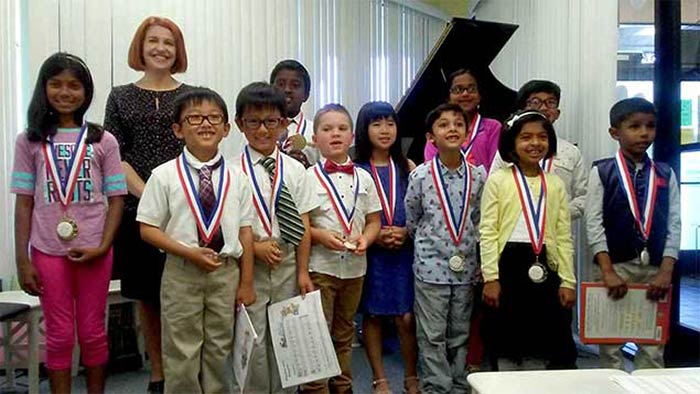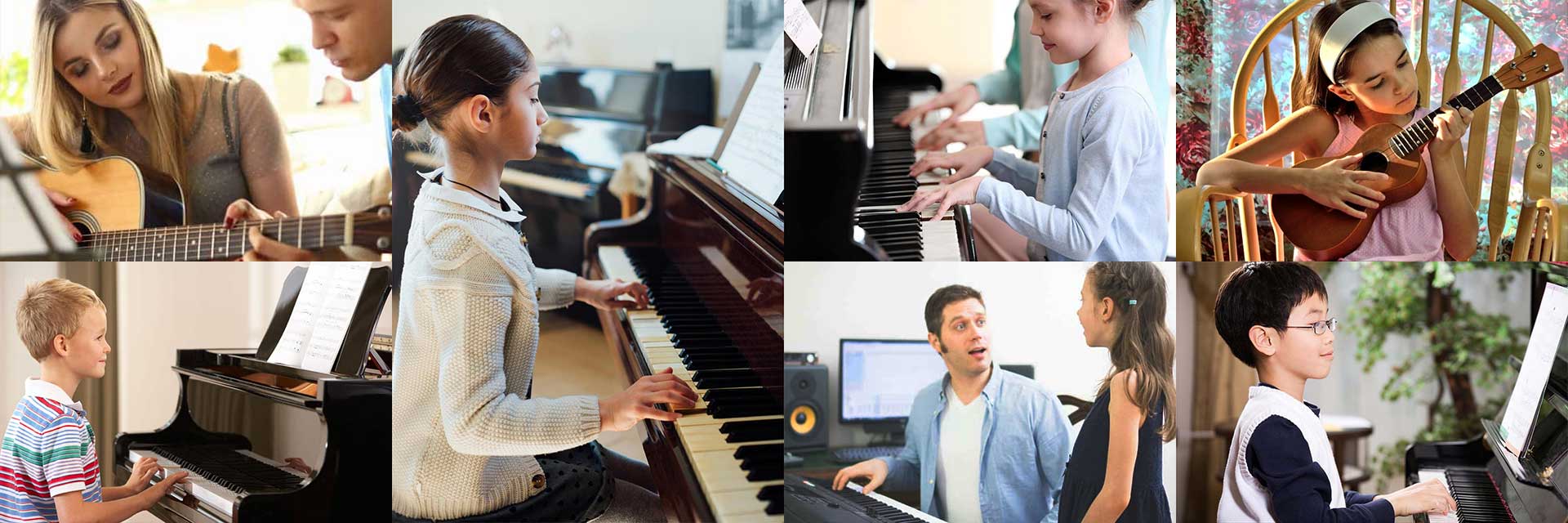Piano Forte Music School provides piano lessons for children and teens, in levels ranging from beginning to intermediate and advanced. Children as young as 5 are welcome.
In beginning lessons, the foundations of piano are emphasized in order to provide a basis for more advanced concepts. Intermediate and advanced classes take on classical pieces and music theory while honing performance skills. Students use the Alfred Basic Piano Library Course Pack as their learning resource.
Children and teens with a love for music and the motivation to learn find that piano lessons can be a very fulfilling activity. Researchers have found many benefits that learning to play an instrument provides, including:

and more…
As children grow into teens, their critical thinking skills develop making their piano lessons easier. Their greater attention spans and ability to learn complex concepts easier than younger children makes practice more fun and engaging, with these advantages getting even stronger as they mature into adulthood.
Dedicated piano students, no matter the age, will experience the joy that music brings into their lives.
Piano Lessons for Children and Teens - Curriculum
Children and teens taking piano lessons at the beginner level will learn the fundamentals of proper technique for playing piano. These fundamentals create a solid foundation for the beginning student, irrespective of the style of music that the student learns. At this level the basics of music theory are introduced.
Several of the foundation concepts that beginning students will learn include:
- Correct body posture, hand position and arm movement
- Notation, note and rest values
- Key names
- Accidentals (sharps and flats)
- Time signatures (4/4, 3/4, 2/4),
- Musical articulation (staccato, legato, accent, tenuto, fermata, etc.),
- Musical symbols, terms and dynamic signs
- Introduction to the five finger pattern
- Introduction to intervals, whole and half steps
- Tetrachords and major scales and tempo marks
Resources: The Alfred Basic Piano Library Course books are used in the study of piano foundations.
As beginning students develop, they are introduced to additional skills including:
- Introduction to Major and Minor scales
- Introduction to arpeggios, triads and inversions
- Intervals
- Introduction to cadences
- Deeper knowledge and understanding of musical signs and terms
- Melodic phrase structure (motif, repetition, sequence)
- Introduction to the damper pedal
- Development of musicality and introduction to classical repertoire: Introduction to composers such as J.S. Bach (From Notebook for Anna Magdalena Bach), J. Haydn, W. A. Mozart, F. Schubert, R. Schumann, P. Tchaikovsky, D. Shostakovich, D. Kabalevsky and more.
- Development of technique:
- Introduction to Junior Hanon exercises
- Practicing scales and arpeggios on 2 octaves
- Introduction to chromatic scale
- Introduction to Etudes (C. Czerny)
Piano lessons for children and teens at the Intermediate level will focus on a classical repertoire from all four periods of music: Baroque, Classical, Romantic, and Contemporary. Students will develop musicality and an understanding of each musical period. The focus will be on developing overall technique and finger dexterity, along with a richer background in music theory. A wide range of exercise material will be individualized for each student.
Intermediate students will study:
- A greater understanding of Major and Minor Key Signatures
- Major, Minor, and Chromatic Scales
- Intervals (Major, Minor, Perfect, Augmented, Diminished)
- Primary and Secondary Triads
- Introduction to the Dominant Seventh Chord
- Cadences (Authentic, Half, Plagal, Deceptive)
- Melodic phrase structure (Motif, Repetition, Imitation, Sequence)
- Transposition and Modulation
- The four periods of Music History: The Baroque Period, The Classical Period, The Romantic Period, The Contemporary Period
- A deeper development of musicality through understanding different periods of music and composers:
- Baroque Period: J.S Bach, G. F. Handel, D. Scarlatti, etc.
- Classical Period: introduction to Sonatina and Sonata-Allegro form; M. Clementi, A. Diabelli, J. L. Dusek, J. Haydn, W. A. Mozart, etc.
- Romantic Period: F. Chopin, R. Schumann, F. Mendelssohn, C. Debussy, etc.
- Contemporary Period: D. Schostakivich, A. Khachaturian, D. Kabalevsky, etc.
- Development of technique:
- Extended Hanon exercises: Hannon Virtuoso Pianist
- Practicing scales on four octaves
- Practicing triads on four octaves
- Etudes (C. Czerny)
Piano lessons for advanced students will focus on working on more technical exercises, as children and teens at this level perform more complex pieces from the four periods of music and acquire a deeper knowledge of music theory and music history. An emphasis on piano performance technique helps prepare students for public performances, competitions, piano recitals and other events.
Advanced students learn concepts and skills such as:
- Scales and Intervals
- Modes
- Chords
- The Secondary Dominant
- Cadences, Chord Progressions, Augmented Sixth Chord
- Nonharmonic Tones
- 20 th and 21st Century Compositional Devices
- Fugue
- Suite
- Sonata-Allegro Form
- Rondo Form
- Themes and Variations
- Music History: the four periods of music and composers such as J.S Bach, L. Beethoven, W.A. Mozart F. Chopin, S. Rachmaninoff, F. Liszt, C. Debussy, M. Mussorgsky, S Prokofiev, etc.
- Development of technique:
- Extended Hanon exercises (on white keys, on black keys, staccato technique)
- Scales on four octaves, contrary motion
- Chromatic scale, contrary motion
- Triads on four octaves
- Brahms - 51 Exercises for piano
Piano Forte Music School provides piano lessons for children and teens who are interested in learning to play piano. We teach students from RWC, Palo Alto, Fremont, Hayward and throughout the San Francisco Peninsula. Classes are available for ages 5 and older at our piano school in Redwood City, California. Contact us to enroll today!
Marie is not only experienced and a talented pianist, herself, but she is great with her students. My son was probably on the younger side when he started lessons, and she was always so encouraging and patient with him. She gives lots of positive feedback, but is also not afraid to challenge him. Marie is professional, accommodating, and friendly. My son has learned so much under her training, and I love hearing him practice at home. His plays more complex pieces now, and I’m amazed at how fast he’s improved even in a year’s time!
Ellice K.

